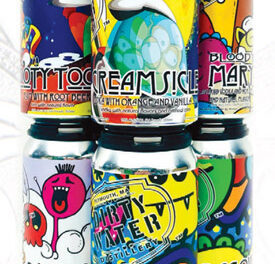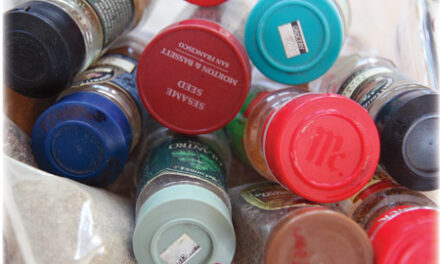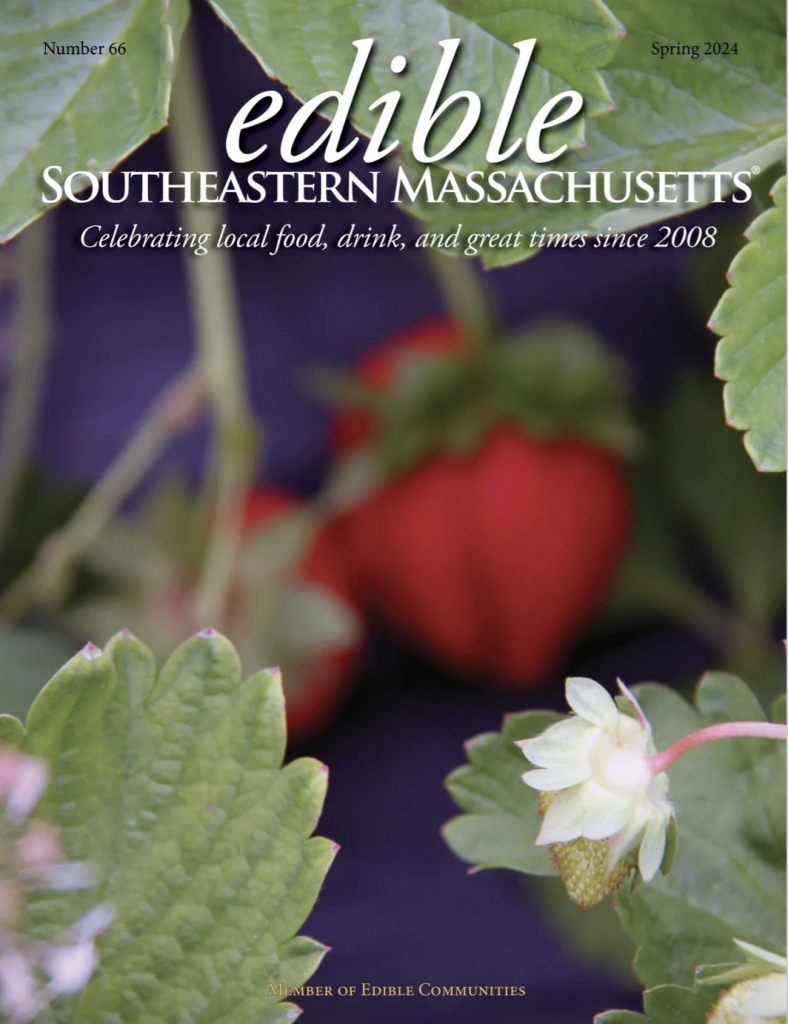By Jacqueline Cain.
Photos Courtesy of Marissa Lee Dyckman.
Bees Honey Makes Beer Money: A sweet story of craft collaboration
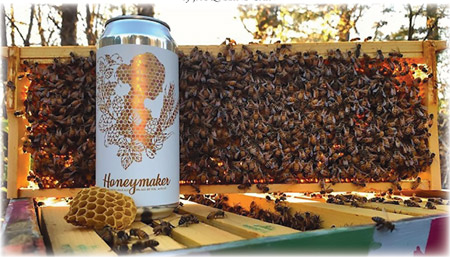
Like many agricultural pursuits, beekeeping flourishes with the right surroundings. Hanson local Marissa Lee Dyckman is learning more about the science and art of keeping bees, and by doing so, her own professional life is thriving too.
This year, Widowmaker Brewing Company, the Braintree beer enterprise where Dyckman is a weekend bartender, is paying her way to study in the prestigious Cornell University Master Beekeeper Program. Widowmaker is also the largest wholesale customer of Dyckman’s wellness company, Evolving Artisan, using honey from her bees as a key ingredient in two popular, award-winning New England IPAs: Honeymaker and The Bees Made Honey.
Nicknamed “the queen bee” around the taproom—especially when she sports one of the medals that the honey beers have earned for Widowmaker—Dyckman says, “I feel like more than an employee.”
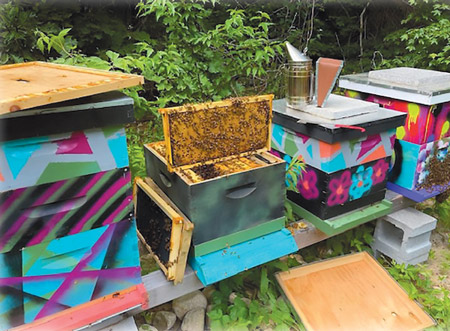
The worker bees that populate Dyckman’s hives have a mission, to protect their own queen while also keeping the hive functioning through the completion of their many tasks. After building an orderly honeycomb system inside their hive, they venture out to bring back nectar, which is stored in the comb and converted into the honey that sustains the queen and hive throughout the colder months. It’s a team effort—and it’s not a bad metaphor for a growing craft beer company. (Note bees also collect pollen that is used as a protein source for the hive, as well as for pollination of other plants.)
“We’re only as strong as every employee is,” says Ryan Lavery, Widowmaker founder and director of brewing operations. “Our beer has never been better than it is right now, and I could have said that at any point over the last four-and-a-half years,” he continues. That’s thanks in large part to Widowmaker employees, he says, who “work tirelessly for us. So why wouldn’t we support them directly if we can?”
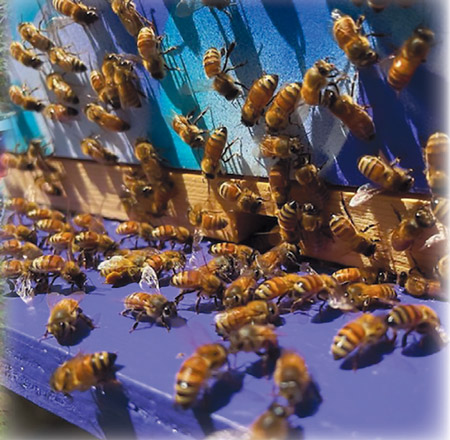
A native of Pembroke, Marissa Lee Dyckman is a longtime craft beer fan and a mother of three. She began working at Widowmaker in 2018, around the same time she enrolled in the Plymouth County Beekeepers Association’s Bee School—the club’s program for beginners—and set up the first two hives in her family’s backyard. The prior year, the Dyckmans had purchased the three-acre Hanson property where her husband had grown up in a house built by his father. The homestead abuts three active cranberry bogs and an irrigation reservoir, which is stocked annually for recreational fishing. Dyckman loves the wild, secluded nature of the property, and “it was important to me to use our land for something,” she says. She debated getting goats (still a dream she harbors) but decided on beehives after learning about the local Bee School. She managed six hives at home in 2021 and hopes to have 10 by April.
The Dyckmans don’t cultivate a grassy lawn, but instead allow dandelions and clover to spread throughout the yard. They have a vegetable and flower garden, and they raise ducks and chickens along with the bees. The latter aren’t anything like pets. “They’re literally wild animals that you are just keeping happy enough to keep in your yard,” Dyckman says.
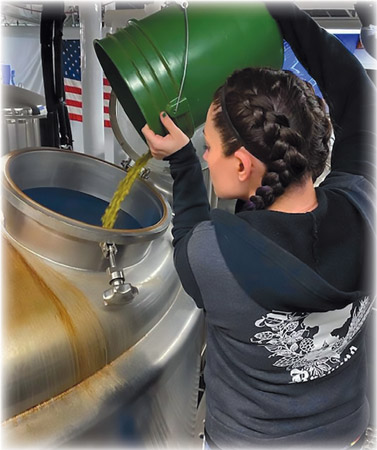
The honey her hives produce comes from the nectar of everything growing around her yard, and likely from flora beyond her property, too. The bees can travel for miles. “You don’t know if they landed on your neighbor’s patio that has whatever kind of flower that’s not [native],” Dyckman notes, so she doesn’t label her honey as “clover” or “wildflower”-derived as some beekeepers do. All the honey Evolving Artisan sells is blended from Dyckman’s hives, and the yields vary depending on the hive.
“I’ve had one hive produce beautiful golden honey and the hive right next to it produce a ruby red, [or] maroon-colored honey,” she says.
In addition, beekeeping is educational for her children, whom she began homeschooling in 2020. The oldest, Ava- Lee, is “my little beekeeper buddy,” Dyckman explains, noting the 10-year-old’s fearlessness and empathy toward swarming bees. It also teaches business skills: Ava-Lee labeled all the glass jars for Evolving Artisan’s 2021 honey blend, and she saves her income in a piggy bank.
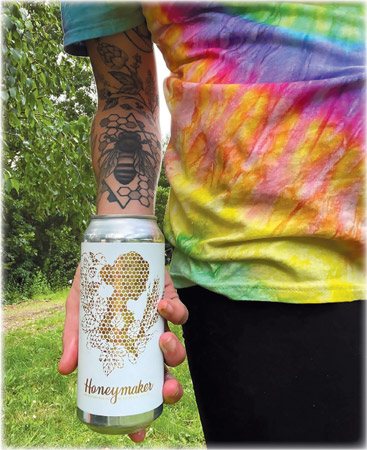
“There’s always something new to learn too, and that’s why I’m really excited to do the Master Beekeeping course that Widowmaker helped me [access],” Dyckman adds.
While working in the taproom at Widowmaker, Dyckman also became interested in learning about the brewing process, but the homeschooling mom couldn’t swing the weekday schedule of her colleagues in production. “I wanted to harness her passion for” making beer, Lavery says, so he suggested using her honey in a recipe.
They timed that initial brew day for International Women’s Day, on March 8, 2020. The date is when the national Pink Boots Society sponsors brewdays across the country in support of its nonprofit mission to educate, train, and support women in the brewing industry. In the spirit of more direct action for its own employees, Lavery says, Widowmaker decided to use the $2,000 revenue from the 2021 Women’s Day brew to fund Dyckman’s tuition and travel to the Cornell program. The Master Beekeeper course began in February and is a 15-month online and in-person certification curriculum.
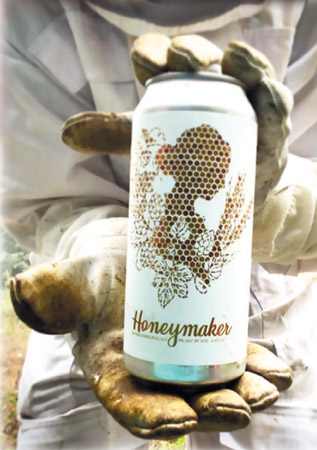
Widowmaker buys 50 pounds of Evolving Artisan honey, or about the annual yield of one of Dyckman’s hives, for every batch of Honeymaker and The Bees Made Honey, a luscious triple IPA version. The honey makes these beers stand out among New England IPAs, Widowmaker’s most popular style of beer. “It gives it this creamy mouthfeel, which I think a lot of brewers would use lactose to achieve,” Lavery says.
Slightly sweet, citrusy, and surprisingly light for 8% alcohol-by-volume, Honeymaker has become a favorite release on Widowmaker’s beer production schedule. Returning on draft at the taproom and in cans about every three months, beer fans are attracted to it like bees are to honey. After an initial 15-barrel batch of Honeymaker, Lavery scaled it up to 30 barrels and he hasn’t looked back, he says. It consistently sells out within a week, despite the fact that 80% of each batch is sold directly from the Braintree taproom instead of being distributed.
While bartending, Dyckman fields plenty of questions from customers asking when Honeymaker and The Bees Make Honey will return, because they know their server is also the honey maker herself. The beers’ releases bring to the taproom some of Dyckman’s acquaintances from the Plymouth County Beekeepers Association too. “It’s a really cool feeling when other beekeepers that don’t always drink craft beer come in and buy that beer because they know the honey comes from someone local,” Dyckman exclaims.
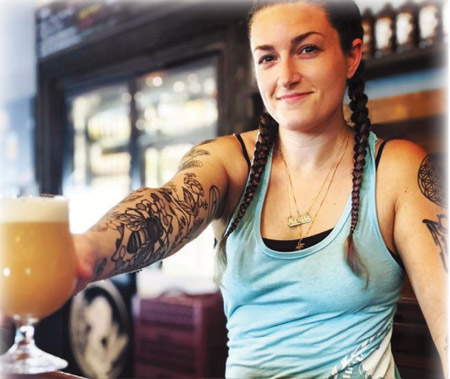
The honey beers have also helped to raise Widowmaker’s profile. In 2020 and 2021, the National Honey Board’s annual Honey Beer Competition awarded Honeymaker the bronze and gold medals in the IPA category. With picks adjudicated by certified beer judges based on aroma, appearance, flavor, mouthfeel and the role honey plays in the beer, Lavery is pleased that Honeymaker earned gold alongside well-regarded breweries such as Jackie O’s of Athens, Ohio. The Bees Made Honey also boasts a gold medal in the 2021 Design category.
The awards are like a sweet garnish atop a year that, despite pandemic-related challenges, saw Widowmaker add new customers, new warehouse space, more production equipment, and even the company’s own refrigerated box truck. Lavery points to data from the app Untappd, where fans “check-in” in real-time about the beer they are drinking, to show Widowmaker’s growing popularity. Compared with breweries throughout the U.S., it’s the 14th fastest growing on the app, with check-ins of Widowmaker beers more than tripling from 2019 to 2021.
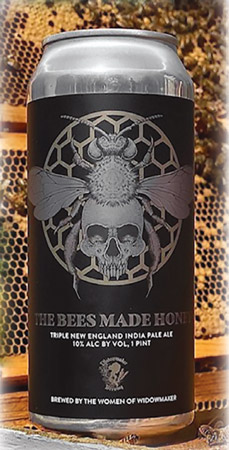
Widowmaker has grown alongside the area’s beer scene in general. When it opened, the region recently welcomed Barrel House Z in Weymouth. Now it’s also home to the much-hyped Vitamin Sea Brewing right next door to Barrel House Z. Trillium’s new headquarters in Canton, located just across the Blue Hills Reservation from Widowmaker; and others. More breweries are a good thing, Lavery says: It brings more beer fans to the area. He and Dyckman both recall numerous times that visitors’ trunks were already full of cans from nearby breweries when they would bring out curbside pickup orders during the lockdown days of the pandemic.
After completing her master beekeeping certification, Dyckman hopes to grow her own company so that she can add more hives. Lavery is happy to subsidize his employee’s individual goals with the profits of the honey beer, because making people feel supported cultivates a strong team back at the taproom. But there’s a simpler reason, too. “Widowmaker is gonna keep growing,” Lavery says, “so I’m going to need more honey.”
Widowmaker Brewing
220 Wood Road
Braintree, MA 02184
(781) 849-0205
www.WidowmakerBrewery.com
Evolving Artisan
Hanson, MA 02338
(508) 843-0200
www.EvolvingArtisan.com
Jacqueline Cain is a writer and editor living in Jamaica Plain. She studied beer (and journalism) in Vermont but returned to her native Mass. for the seafood (and also, beer). She goes by @ jackiecain online and IRL.

